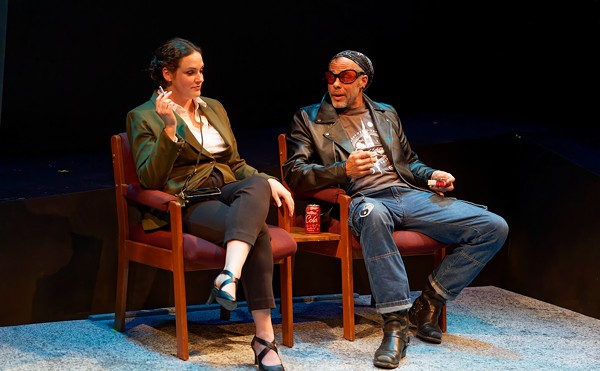However, reflects Barron, "Having mentioned to so many customers, 'We think something really big is going to happen soon,' I haven't mentioned much to customers about BookSense.com for a while. We'll just wait."
Waiting has been what stores such as Left Bank have been doing for the last year, and will do some more, apparently. BookSense.com was to be fully operational in August of last year but, as a result of technical difficulties, was delayed until the holidays, then delayed again until July 5. But that debut has fizzled as well.
"On July 5, we got excited here -- at least I did," says Barron, "because it looked like we were really ready to register and get started adapting our Web site. Then I realized -- I had to ask to find this out -- that other stores would get the play but not us."
Those other stores include the Bookmark in Vincennes, Ind. Why is a bookstore located a full state away being used as an example? Because if you're in St. Louis and order a book from BookSense.com, the Bookmark is getting your business, not your local independent bookseller, Left Bank.
"Ideally, the way it's supposed to work," explains Barron, "is in two ways. One of them is that a customer who wanted to order a book could go directly to (Booksense's) database through our site. It would happen more or less transparently. You could order the book and it would be shipped either to the customer directly or to the bookstore for the customer to pick up. It allows stores like us to make use of the database. They have thousands of stores, ideally, hooked into this one central database.
"Another way it would benefit us would be if someone went directly to BookSense.com to order a book. It would be shipped to you, and it would be credited to the Booksense store nearest you, which -- once we are officially registered with them -- will be us."
The Bookmark is "officially registered" because it did not create its own Web site. "Self-authored sites had to wait a little longer because (Booksense) wasn't ready to deal with self-authored sites," says Barron, "only with sites that were going to use their templates."
So those independents that just waited at the station like a bunch of slackers for the Booksense train to come over the hill -- they're in business. Those booksellers with some initiative, those willing to confront their technofears and create Web sites of their own, those with a degree of independence -- their business is going to Indiana.
Barron tempers his own criticism of BookSense.com. As Left Banks' webmaster, he has some understanding of the complexities involved: "As frustrating as it was, it made sense. If they're creating this for the first time, and trying to get it to work for the first time, then of course it's easier to use stores that are going to use their system and their template. Then 'We'll get around to you holdouts who want your own individualized Web sites.' I can see how they would come first, but we didn't know that. We thought we were all going to be ready to go at the same time.
"I think they could have done a better job of keeping us apprised. If there's any frustration, it comes from not knowing what's going on."
Len Vlahos, director of BookSense.com, sounds a little defensive over the phone when questioned about the status of the e-commerce enterprise. "I can't speak to what Phil thinks," he says. "We think we've done a pretty good job communicating."
But then, according to the thumbnail bio of Vlahos on the Booksense Web site, his motto is "the perfect is the enemy of the good" -- the kind of logic that supposes that the failure is no threat to anybody.
That endearing little bio also says that Vlahos once played with a band called Woofing Cookies and that he "pines for those subdued days of rock-and-roll," which is understandable, considering that the ABA has invested $2 million-$3 million into BookSense.com, and Vlahos is still pushing back the real startup date. "We should have it in the shape we want Oct. 1."
Yes, they've delayed the project a number of times, and "we really intended to launch for the last holiday season," but, Vlahos explains, "Nothing's ever been done quite like this. We're sort of reinventing the wheel. It's more complex than we first thought."
Meanwhile, Barnes & Noble, Borders, Alibris, Daedalus and the odious Amazon, among others, have managed to have their Web wheels turning for some time (although, granted, a visit to Amazon these days is like a trip to Wal-Mart). Even the independent Powell's, a book mecca in Portland, Ore., takes out the occasional ad in national publications for its Web site (www.powells.com). A dandy Web site it is too, with engaging interviews conducted with visiting literati (Roddy Doyle, Michael Ondaatje and Gish Jen, for example) and members of the staff. There's a Web sale table, contests for free books, staff picks from an idiosyncratic group of booksellers (Mary Jo, for example, has "a penchant for trashy vampire fiction") and free shipping for purchases over 50 bucks.
BookSense.com is downright dowdy by comparison. "Fun in the Stacks," for example, includes some "mind-bending" games, "Cryptogram" and "Phrase Invaders" ("This retro-chic game pits you against attacking letter-aliens..."). Click on either game, however, and there's nothing but a blank screen. It is possible to buy books now, but if the point is supporting your local indie shop -- go Hoosiers.
"Sure and steady wins the race," muses the imperturbable Barron. Meanwhile, as far as Left-bank.com is concerned, currently there's a "low-tech order form," which is essentially e-mail. For the future, Barron says "We're adding more content -- that is, books, in various categories.
"We're making the Web site ready so that when we hook it up to the (BookSense) database, everything will be up and ready to go, so that books that you see, instead of just reading about them and getting information -- which is always nice -- hopefully those will also be linked. Once you click on them, then you'll find yourself in the position to buy the book."
In the meantime, BookSense.com still isn't able, quite yet, to provide the service to booksellers and book buyers it had claimed it would more than a year ago. But, according to Vlahos, at least five stores are being connected to the hub site each day, 50 in the last week. Soon customers will be just a click away from the kind of knowledge and expertise that only indie stores provide. When Vlahos speaks of the vulgar practices of Amazon.com, which actually offered cash prizes to customers for capsule book reviews, he sounds as if he needs to rinse the bad taste out of his mouth. Customers who seek advice from an independent bookseller, says Vlahos, do so because they "know the strength of the recommendation."
This fall, for sure. Won't Jeff Bezos tremble when he hears the bells and whistles of October?
Related links:
amazon.com
barnesandnoble.com
borders.com
powells.com
left-bank.com
booksense.com
daedalusbooks.com
alibris.com





